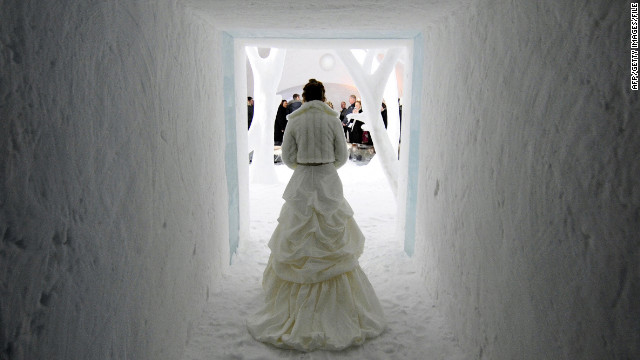 The Traveler's Psyche is a series focusing on travel scenarios that stir emotion. We've looked at rage, frustration and the TSA, plus passions shaped by travel, whether it's love for a person or a plane. Coming this week: some unexpected airline goodness.
The Traveler's Psyche is a series focusing on travel scenarios that stir emotion. We've looked at rage, frustration and the TSA, plus passions shaped by travel, whether it's love for a person or a plane. Coming this week: some unexpected airline goodness.
(CNN) -- Leza Dabit spent more than $2,000 recently to attend a friend's wedding in Jamaica with her boyfriend. The weekend before, she was in Columbus, Georgia, celebrating nuptials, and the weekend after was spent feting another couple's marriage on Hilton Head Island, South Carolina.
And Dabit is just getting
started. She's got four more weddings to go before mid-December. Dabit,
a business development manager for an IT staffing company in Atlanta,
receives only 10 days of vacation.
Weddings are lovely, one
of the few occasions when people still get dressed up, tuck their
gadgets away and observe longstanding traditions. But my, can traveling
to a wedding get expensive. And the preceding engagement, bachelor and
bachelorette parties and showers will slash into your savings too,
should you choose to run that gantlet. The ensuing baby showers and
family reunions may lump on another travel expense for our increasingly
mobile society.
These obligations are
eating up vacation days and discretionary (and not-so discretionary)
income, but it's often nearly impossible to say no. And there are very
good, fabric-of-our-society reasons for that. Still, what is a mere
mortal to do in the face of seven weddings?
"All my extra money goes to this," said Dabit, 30. "Every weekend is a blast, don't get me wrong."
She's already hit a
bachelorette weekend in Nashville and plans on a beach getaway for
another bride in Florida, but she ran out of vacation days and can't go
on a cruise with another close friend and bride-to-be.
Next year doesn't look
nearly as busy for Dabit on the event front, and she won't be taking her
weekends for granted. "I think I'm going to take a trip for me next
year."
Her situation is not
unusual. Forty-one percent of U.S. adults use the majority of their
vacation budgets on obligation trips such as weddings, holiday
gatherings and reunions, according to a July Hotwire survey.
The average cost to
attend a wedding as a guest is $339 this year, down from $490 a year
ago, according to the American Express Spending and Saving Tracker. If
you're in the wedding, the average cost this year is $377, down from
$539 in 2011. A far-flung destination wedding can easily set you back
double that amount.
Dabit has politely
declined invitations before, just sending a gift, but all seven of this
year's events are weddings she wouldn't want to miss.
Sociologist Jeffrey Alexander sees spending freely to celebrate big milestones as evidence of what people value.
"On the one hand, doing
these rituals is a way of showing that you're not a materialistic person
and that you value your close friendships," said Alexander, a sociology
professor and founder and co-director of the Center for Cultural
Sociology at Yale University. "At the same time, we do live in the
economic world."
Weighing finances is
prudent, but so is weighing your relationships. Turning someone down for
a life-changing event can be damaging.
"I think that is a kind
of test," Alexander said. "If you invite somebody and they don't come,
then they're not willing to put their money where their mouth is.
They're not showing that they actually care about you."
But caring for a friend to the tune of $1,000 can be a tall order.
Brittany Winfeld, 27,
was faced with a choice: spend nearly $1,000 on a close friend's
bachelorette weekend in Miami or pay for her medical board exams.
"For me, my career is
more important than a weekend getaway," said the medical resident who
lives in New York. "The most important thing for me is to attend the
main event: the wedding."
And attend, she will.
She's going to five in the next year: one in the Caribbean, one in
Florida, one in Massachusetts and two close to home in the New York
area.
She estimates that she
and her husband will spend $4,000 on the Caribbean getaway alone, which
they plan to turn into a vacation since they will already have traveled
more than a thousand miles from home.
Winfeld has a few weeks
left in her residency before starting a fellowship. Her husband is also a
resident, and the couple is shouldering hefty student loans.
"It's a definite
financial burden to me and to him," she said. But she feels like she
can't say no to these events, and the stretch is worth it for their
really good friends.
"These people were there
for me for my wedding, and I would feel terrible saying no, because
they were there for me," Winfeld said.
 Wedding on a budget
Wedding on a budget
And the budget? "We kind of threw that out the window."
There are right ways to
say no, says Anna Post, co-author of the 18th edition of "Emily Post's
Etiquette" and great-great granddaughter of the grande dame of gracious
behavior.
"If you know right now,
in the middle of June, that you are not going to go ... however you come
to your choice, once you make it, make it early and tell people right
away," Post advised. "It doesn't count when it comes to etiquette if you
didn't tell anybody."
You don't have to share a
reason, but if you do, be honest about it. It's no good saying you
can't afford a destination event and then heading to Italy two weeks
later. In that case, say that you've made other vacation plans or that
you've committed to something else, Post says. Don't say yes and reverse
your decision later. It's better to thank someone for an invitation and
wait to reply when you're sure.
Post did say that
turning someone down for a major milestone "can be very
statement-making." She calls weddings, christenings, funerals and other
important moments "precedent-setting events."
"It's much easier to
carry on a relationship with someone, even if it's a rough relationship,
if you participate in the big events," Post said.
Joining friends and family hasn't always been such a big production.
The crossing of states
and continents to be part of social rituals has picked up over the past
30 years as more people earn college degrees and participate in a
national labor market, according to Alexander. More Americans leave
home, go to college and never look back, so friends and family are
scattered.
Saying no to traveling
across the country for special occasions seems to be getting harder.
People used to accept the idea that an event might just be too far away,
Alexander says. "Now there's an expectation that there's no excuse,"
especially within the continental United States.
Cheaper and more
accessible air travel, more affordable telephone service and the
emergence of virtual communication have all given rise to people coming
together more readily from long distances to mark milestones with their
peers, Alexander says. People ages 18 to 30 are especially likely to
ignore the barriers of physical distance, because they're used to the
virtual closeness of daily communication with their friends on social
media.
And the most important ties are sustained through rituals.
"It's kind of the
opposite of the uncertainty that we all have in our society. I mean,
we're all uncertain about our jobs, about our children, about success,
about relationships -- whether we're married or not," Alexander said.
"Ritual is reassuring and connecting."
Connecting or not, there's still nothing that says you have to attend.
"Anybody that feels they
have to succumb to social pressure, whatever it is ... they need to
realize the importance of listening to your inner self and developing
your inner self," said Amitai Etzioni, a sociologist and director of the
Institute for Communitarian Policy Studies at the George Washington
University. "It's not automatic that the community has the right of
way."
Part of what complicates
matters and creates that to-go-or-not-to-go tension is the fact that
the social norms that existed before the sexual revolution and the civil
rights movement were upended in the late '60s. Since then, everyone's
been coming up with their own rules and trying to create unique,
distinctive events to celebrate their lives, says Etzioni, who edited
the book "We Are What We Celebrate: Understanding Holidays and Rituals."
Weddings used to be "a ceremony, a reception, dinner." Now, some are three-day events.
So many situations today require deliberation and negotiation and often lead to misunderstanding.
"In the olden days, if you went on a date, there was no question, the boy paid. Now, it's complicated," Etzioni said.
"Nothing is etched in stone anymore."
No comments:
Post a Comment